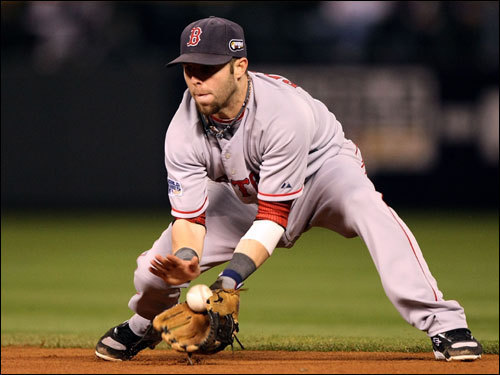Are There Any Good People Left in Baseball?

Recent issues of Sports Illustrated implicitly raised and perhaps answered an intriguing question. The August 15 issue features a cover story on Red Sox second baseman Dustin Pedroia. Tom Verducci presents Pedroia as combining off-the-charts ability with an off-the-charts attitude. Pedroia lives for baseball and plays it better than everyone else.
So why haven't fans embraced him? It's possible they have become cynical about players who seem too good to be true.
To those of us who experience the frequent pleasure of seeing Pedroia play, Verducci’s account rings true. The ability of someone diminutive (he’s listed as 5’ 9, 180, widely considered generous) to hit with power (16 home runs) is remarkable enough, and there’s only one possible explanation for Pedroia always swinging from the heels while rarely striking out: hand/eye coordination beyond that of mortals. Have I mentioned that he stands far off the plate yet has no trouble reaching pitches even beyond the outside corner? To complete the picture, he is a terrific infielder and, despite unremarkable speed, a superb base stealer.
As Verducci tells it, Pedroia’s innate ability has come to the fore because of an extraordinary work ethic. He practically lives at the ballpark (literally – his apartment is across the street from Fenway Park), and apart from being a devoted dad, has no interests or hobbies to distract him from his consuming passion for baseball.
Yet the overdue SI cover story was a rare instance of national attention for Pedroia. For some reason, even Red Sox Nation hasn’t embraced him quite as fully as you might expect. A little guy who may be about to win his second MVP award and never plays with less than total commitment? There should be babies and sandwiches named after him, but you don’t get the worshipful buzz you once did for, say, Nomar Garciaparra or even (gulp) Manny Ramirez. Why?
An explanation may have been supplied in the August 8 issue of Sports Illustrated, in a poignant article by Phil Taylor about Pete Rose. The fallen star hangs out in Las Vegas (not gambling, he says – care to bet?), signing everything in sight for $$ and complaining about his expulsion from baseball: “I would have been better off using steroids, being an alcoholic, doing drugs or being a spouse abuser. All those guys get second chances, but not me.”
He may have a point, but it needs to be said that Rose has plenty to answer for quite apart from gambling. His legendary aggressiveness sometimes led him to cross the line on the diamond, as when he plowed over Ray Fosse (ruining the promising young catcher’s career) in an all-star game and attacked the frail Buddy Harrelson for no good reason. Perhaps more to the point, who can be sure that Rose’s admitted use of amphetamines, baseball’s illegal substance of choice in the pre-steroids era, didn’t help fuel his frenetic playing style?
The fate of Rose, another mega-intense over-achiever, may help explain why Pedroia hasn’t received the reverence one might expect. In a day and age that has produced too much disillusionment from too many guys like Rose, we may be reluctant to embrace anyone too fully, even someone who seems as pure as newly fallen snow. Think about the pain experienced by fans of Barry Bonds, Roger Clemens, Mark McGwire, and Alex Rodriguez. It’s not just steroids. Think O.J. Simpson disappointed a few fans? Tiger Woods? Michael Vick? LeBron James?
I don’t think anyone’s expecting Dustin Pedroia to kill any people or animals, to receive a five iron to the head from his wife, to bet on baseball, or even to leave Boston for free agency. And, his surprising power notwithstanding, he doesn’t seem the type to juice up. But it may nevertheless be the case that Pedroia pays a price for starring in an age of justifiable cynicism and suspicion. It’s unfair and unfortunate, but in our fallen sports world someone like Dustin Pedroia seems literally impossible.

